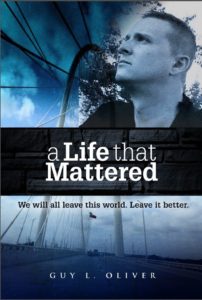In every way, it seemed, my son’s life was returning to normal. He would call to chat from time to time, and report on his progress in school and he would talk about his plans for when he was done. He had been in touch with his cousin David, a former Marine who started his own business building oil derricks in West Texas.
He would tell me the stories of his future, working with David until he gained enough experience to become certified as an underwater welder, a very lucrative, but dangerous vocation. He dreamed of saving money for college so that he could transition out of a vocation and into a profession, having no idea what he might do—but intuitively understanding that his planned vocation was a young man’s job.
A sense of pride would come over me as I listened to his words—the words that contained so much wisdom and represented such a fine work ethic. He didn’t want to be a welder, but he was satisfied with this trade as a humble beginning. He was as certain as any of us that he now had a future. A future of hard work, money honestly earned, and a college education. A future that would include marriage and children. A future bright as sunlight, and I took great comfort in the commentary of his plans.
“As for Luke, he felt happy and contented. The tide of fortune seemed to have turned in his favor, or rather in favor of his family.”
– Excerpt Struggling Upward
Horatio Alger
Just as the addict threatens the well-being of every man he touches, those fortunate and determined enough to find recovery lift up those they contact. Tim was healing and in the process he was healing each of us.
When you lose a loved one to addiction you too are afflicted. You want so badly to heal them, yet you know in that moment, in that circumstance, you have no power. The power to heal comes from within the individual and once on the road to recovery, the frustration, the sadness, the anger, all begin to abate.
And at first you hold your breath, but then you begin to heal. As though you are integrally entwined, your healing child, your recovering spouse, your returning friend, slowly but surely touches your life and the ravages of the maelstrom are rebuilt and your relationship is reborn.
In Tim’s case, there were obstacles but each time a hurdle presented itself we overcame it, and each time it became a little easier than the last because we pulled together. He and I. He and his mother. He and his sister, Rachel. He and his friends.
He and I would plan his future. His mother provided a home. Rachel fomented social normalcy as she introduced him to her son. His friends gave him a constructive social outlet, enabling adult companionship.
Even his sister, Ashley, who refused to forgive his transgressions right up until the end, began to soften her emotional stance toward him. During a visit with their mother, Dawn’s partner, Margaret, who was holding Ashley’s son, gently placed him in Tim’s arms and said
“Here. Meet your nephew.”
And oh how he loved holding children. He achieved no greater joy than simply holding each of his two nephews, and Ashley saw this. Little by little she began to see the person he was becoming—someone who owned his mistakes, shunned the addiction, and was striving to integrate himself with the rest of us.
And I watched as the man emerged.
“Dad, it’s Tim.”
“Hello Tim. How are we today?”
“I need a little help.”
“Shoot.”
“I’m in town and I need to get back to Fort Worth tomorrow for school.”
“Yes?”
“I need gas money. I’m sorry to ask but I guess I just didn’t plan very well on this trip, and I’m really sorry.”
“Do you think you’re getting off that easy?”
“What do you mean?”
“I mean you’re going to sit down and have a proper meal with me, and then I’ll fill your tank.”
We laughed, but it wasn’t the laughter spawned from a frivolous joke, or an off-hand comment. It was instead the mirth of reconciliation—a sense of comfort as we began to settle back into the knowing of each other.
I sat across the table once again from him and the woman who was now his fiancée, Donna, a colleague at my side. We ordered sushi for the table and my colleague and I taught them to eat with chop sticks, and to mix the wasabi with the soy, and I watched his face as he embraced an alien experience. And he smiled; they both smiled.
Afterward, I followed him to a filling station and I filled the tank of his mother’s pick-up he had borrowed—the one he drove every week from Fort Worth to Cedar Park. We stood there together at the pump and said not a word, satisfied simply to feel the presence of each other. When the tank was full, I replaced the nozzle and gazed at him for but a moment.
Big Tim.
No longer a boy. No longer an adolescent. A grown man engaged to a beautiful woman, finally living a life of meaning. A life worth living. A life that mattered.
It was not the last time I would see him but it is the one I remember best. Like his road to perdition this moment had been long in coming—but unlike his previous journey, this trek was courageous in the taking.
The next time I would see him, would be the strangest moment of all. It was late October, a mere two months later. He had been hospitalized with a perforated intestine. It was a very sudden attack that came with immense pain and yet, in typical fashion, he somehow drove himself to the hospital. He happened to be in town and I received the call from Rachel that he had been admitted to Cedar Park Regional Medical Center just north of Austin.
In her voice I read worry—anxiety. As though this was a potentially life-threatening situation and I mentally dismissed her concerns as immoderate, but decided to seize upon the moment to see my son yet again. During the drive to the hospital I remember the feeling of well-being as though it were a moment ago. Tim had survived so much in his life up to this point that a sense of his invincibility took hold in my very soul.
I smiled as Heidi and I made our way to the hospital entrance and up to his room.
There he was in a hospital gown, Donna to his left, his right hand clutching the stand from which hung the saline bag feeding his IV. We smiled, embraced, and joked but, like his sister, I sensed an anxiety about him. They were treating the rupture with antibiotics, and there was some uncertainty about whether surgery would be required; he even mentioned a colostomy bag.
I looked in his eyes, and for the first time I saw fear. I gazed back with an equally opposing confidence.
“After all you’ve been through? You’re gonna be just fine, son. Just fine.”
Smiling he simply replied
“I know, dad.”
Heidi and I bid him and Donna goodbye with a warm embrace, smiling as we made our way back to the car. And a single scripture from my youth foisted itself upon me:
“And God shall wipe away all tears from their eyes; and there shall be no more death, neither sorrow, nor crying, neither shall there be any more pain: for the former things are passed away. And he that sat upon the throne said, Behold, I make all things new.”
– Revelation 21:4-5
Life had come full circle. My daughters were married with children of their own. And my son? My son had finally loosed himself from the shackles that bound him to the institution of prison, also making a full recovery from what turned out to be a minor medical condition—just as I knew he would.
The minor medical emergency seemed to me in that moment to serve as a metaphor for Tim’s life. It was just one more adversity he overcame in a long string of setbacks. Life had finally been restored to what it was always meant to be. Redemption had finally come.
And then, one day, the phone rang…


